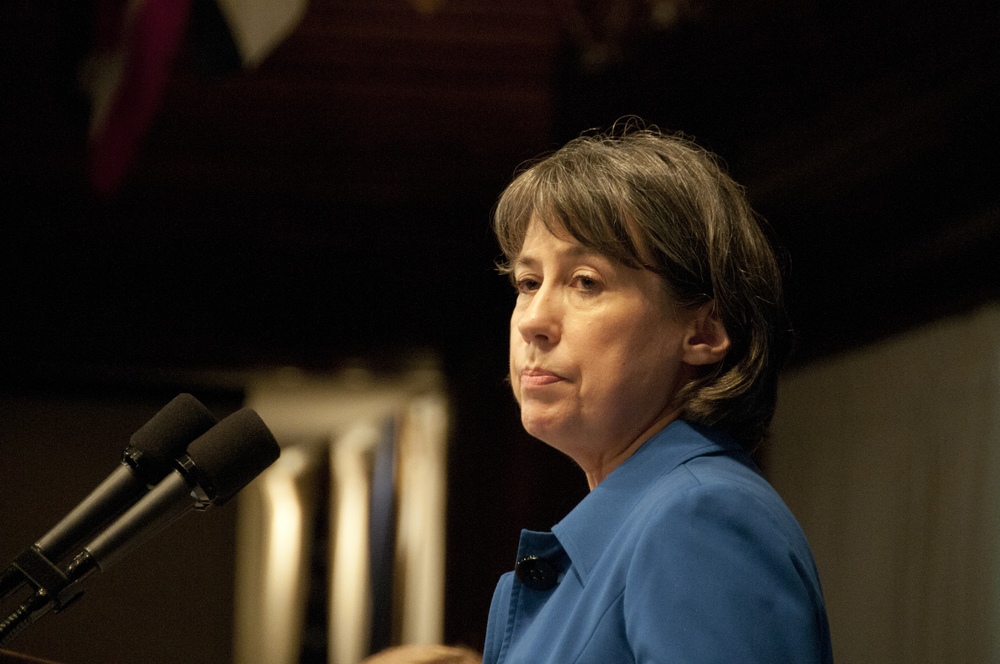A Dire Warning From a Former Bank Boss About Your Money
Andy Snyder|July 30, 2021

“Your money is no good here.”
Those aren’t the words of a generous shopkeeper. They weren’t said between two friends, fighting to pay for each other’s dinner.
No… they’re a look into the future.
They represent the economic disaster that many Washington insiders believe is the answer to all that ails us.
Making our case… Sheila Bair wrote some disturbing words in a few recent op-eds. A note published this week points to a particularly tragic future.
If Bair’s name sounds familiar, it should.
She’s had the typical career of somebody who spent the majority of her life thriving in the swamp.
She was a professor and a lawyer… and bounced around from one federally funded agency to the next. She even had a failed run for Congress.
Most notably, she was in charge of the Federal Deposit Insurance Corporation when banks melted down in 2008.
The history books will treat her well, though. She did the right things at the right times – at least as far as the media is concerned.
But it’s her latest work and words that are drawing attention and have us wondering whether the swamp gas has clouded her vision of reality.
Visions of “Dollusion”
These days, Bair spends her time not managing banks, but working to build standards for companies around the globe to report their effect on climate change. And as a trustee for Economists for Peace and Security, she touts nonmilitary solutions to the world’s issues.
Now she’s using that role and her Street credibility to talk up something new… something quite dangerous.
She’s calling for the Federal Reserve to hurry its rollout of a central bank digital currency.
Adding some color is a piece from 2018. In it, Bair makes it clear she wants the Fed to push the banks she once regulated out of business…
Suppose consumers and businesses could convert their bank deposits into a digital currency that would be issued and backed by the Fed? Let’s call it FedCoin. They would no longer need to worry about bank instability. Since the Fed can print its own money, by definition, it can always make good on its financial obligations.
Bank runs, she figures, would be solved by simply printing more cash. There’d be no more need to worry about a systemic shock… when the whole system is built atop a printing press.
All these shenanigans over interbank loan rates, deposit ratios and repo windows would be tossed out the window. The Fed’s job would be easy…
Dump money in when it’s needed and – shhhhh… they don’t talk about this part – pull money out when it’s not.
The current system, she says, is a nice deal for banks “but hasn’t done a whole lot to help the rest of us.”
Well… excepting the fact she made a heck of a career inside the banking system and, of course, the fact that without those banks creating a reliable and wide-open lending system, our economy would fall flat on its face.
But facts aren’t important when your mission is to simply feel good.
And here comes the ignorance…
But imagine that we all held interest-bearing FedCoin. During inflationary periods when the economy is overheating, the Fed could raise rates on interest which would be paid directly to the general public, giving us an incentive to put more savings into FedCoin and spend less. During recessionary periods, the Fed could reduce the interest rate on that currency, giving us more incentive to spend to stimulate economic growth.
If you’re confused by what she means, just look at the current system. It’s almost exactly what happens now.
Fixing the Wrong Problem
But remember, Bair is a big believer in all of this us vs. them stuff.
She believes in building a divide between the rich and the poor. She believes some folks deserve money more than others. And worse, she’s convinced the only thing that can fix what ails the poor… is Big Gov.
If the Fed reduced rates to zero and the economy still spiraled downward, it could issue special digital coins that would disappear, within a time certain, if not spent on consumption.
And, remember, all of that was written before this latest round of crazy money printing, stimulus spending and flat-out economic craziness.
In the piece she published this week, she doubles down on her belief the government – and only the government – should pick and choose who gets what.
Digital wallets would promote financial inclusion, she writes.
They would “be more accessible to unbanked or underbanked populations, who fear the complexity and fees too often tied to checking accounts,” she says… forgetting the fear and complexity that comes with the government peering into every digital dollar we spend.
“Congress could authorize the Fed to provide initial ‘seed money’ to households as an incentive to set them up.”
Ah yes… just in time for an election, we reckon.
It’s a grand idea.
But wait… there’s more.
Spend Here, Not There
When it comes to future stimulus payments (because they’re the new norm, apparently), Bair is quite fond of digital money.
“By using a Fed-sponsored distributed ledger, the Fed could know the identity of the recipient and track the money to make sure it reached its intended beneficiaries, providing strong controls against fraud,” she writes.
Well, fraud and businesses that weren’t “canceled” by the administration, that is.
This is all nonsense.
But it proves the crypto revolution has the powers in charge chasing their tails. They know they’ve painted themselves into a corner. They know there’s no easy way out. They know the free market has the government-run system on the ropes.
Let’s be clear, though. This isn’t over yet. It’s going to get tough for crypto. The regulators are going to try to chop it out.
But it’s already too late for that.
The government’s fight to erase an alternative will be the very thing that makes the alternative come to life.
They can bark all they want, but the free market will have no problem undermining a system buttressed only by hot air and a rusty, old printing press.
The future looks interesting.






